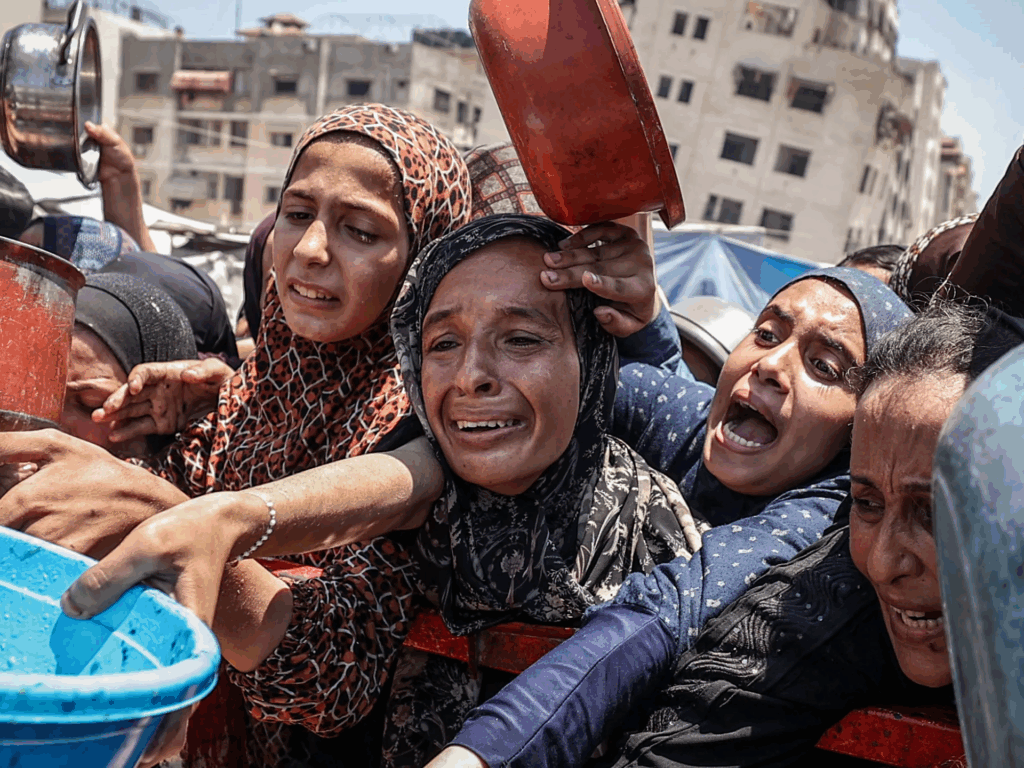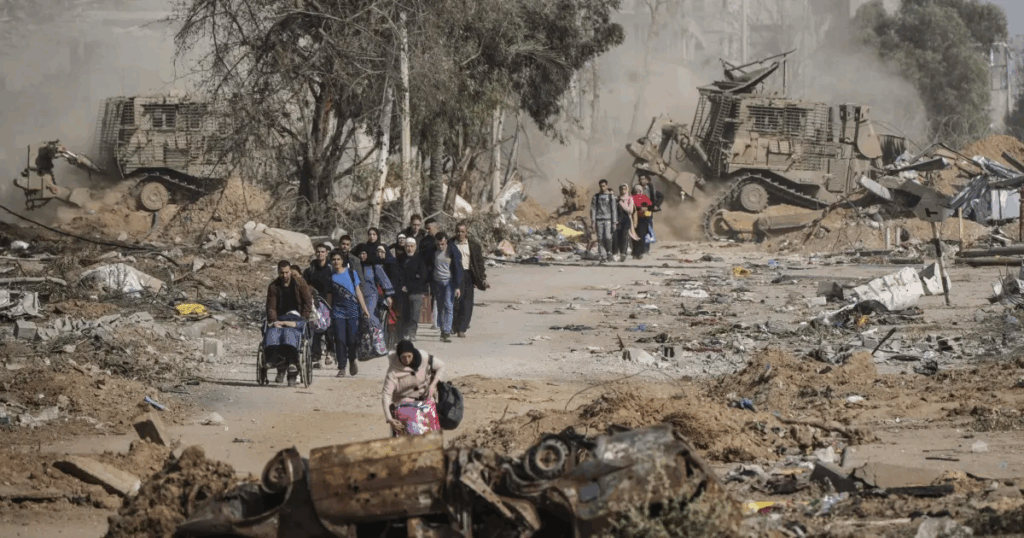After nearly two years of relentless conflict, the Gaza Strip is no longer just a war zone—it is a graveyard of hope, where starvation has become more feared than bombs. The 2.4 million Palestinians trapped in this besieged enclave are enduring what humanitarian organizations now call a “man-made famine,” a catastrophe that is both preventable and deeply political.
Over 100 NGOs—including Doctors Without Borders (MSF), Caritas, Amnesty International, and Oxfam—have issued urgent warnings about the spread of mass starvation. The World Health Organization (WHO) has confirmed that a “large proportion” of Gaza’s population is dying of hunger, with acute malnutrition rates exceeding 10% and over 20% of pregnant and breastfeeding women suffering from severe deficiencies.
A Daily Struggle for Survival
The blockade, intensified since March 2025 and only marginally eased in late May, has crippled Gaza’s access to food, medicine, and fuel. Tedros Adhanom Ghebreyesus, WHO Director-General, described hunger as “another killer, in addition to bombs and bullets.” MSF teams reported record levels of malnutrition, especially among children and infants.
Riyad Rashwan, a humanitarian worker with Islamic Relief France, described his experience of going four days without food: “My stomach no longer rumbles. It has grown accustomed to absence, to nothingness.” His words echo the silent suffering of millions.
Children are the most vulnerable. In just 72 hours, 21 children died from hunger and malnutrition. Hospitals like Al-Shifa in Gaza City are overwhelmed. Infants under one year old are wasting away due to a lack of milk. Pregnant women, weakened by hunger and poor sanitation, are giving birth prematurely, flooding neonatal units already stretched beyond capacity.
The Price of Bread: 3,000 Times Higher
The economic collapse is staggering. The price of flour has skyrocketed to 3,000 times its pre-war cost. Fuel is nearly unattainable. Bank fees for cash withdrawals reach 45%, and liquidity is nearly nonexistent. For most, travel is impossible. Aid, when it arrives, is a matter of life and death.
Palestinians risk their lives for food. Videos show desperate crowds chasing aid trucks, fighting over flour bags. Mohamed Abou Jabal, a displaced father, recounted risking his life for a single bag of flour. UN Secretary-General António Guterres warned that “famine is knocking on every door.”
Aid Blocked, Civilians Killed
Despite the urgency, humanitarian aid is being systematically obstructed. The UN reports that tons of food and medical supplies are stuck at border crossings like Kerem Shalom. Carl Skau of the World Food Programme (WFP) called the situation “the worst” he has ever seen: “People are starving when we have food just across the border.”
The Gaza Humanitarian Foundation (GHF), a controversial organization reportedly backed by the U.S. and Israel, has taken over most aid distribution. The UN accuses the Israeli army of killing over 1,000 people since late May near GHF centers. These sites are described as militarized zones, surrounded by barbed wire and observation towers. People are reportedly shot for arriving too early, too late, or bypassing checkpoints.
Journalists and Civilians: Starving and Silenced
Journalists are not spared. Omar al-Qattaa, an AFP photographer, suffers from hunger and lack of basic medication. Eyad Baba, another journalist, said, “The pain of hunger is stronger than the fear of bombardments.” Their work, essential for documenting the crisis, is becoming impossible.
Constant Displacement
Israeli evacuation orders have affected nearly 88% of Gaza’s territory. Families are forced to move repeatedly, often on foot, carrying what little they have. This constant displacement disrupts aid delivery and access to water, food, and shelter. Children queue for hours just to fill a bottle of water.
Ecological Collapse: The Silent Catastrophe
The humanitarian crisis unfolding is starkly mirrored by an escalating ecological disaster. With infrastructure shattered, waste management systems have been completely destroyed, leading to the rampant accumulation of garbage and untreated sewage. This pervasive pollution directly contaminates vital groundwater reserves and flows unchecked into the sea, posing a severe threat not only to already fragile marine life but also presenting profound risks to human health. Simultaneously, the region faces a critical water crisis; desalination plants, crucial for fresh water, have been severely damaged or rendered inoperable, and the few remaining aquifers are dangerously overdrawn. As a result, people are forced to rely on unsafe and contaminated water sources, a desperate measure that inevitably leads to widespread disease outbreaks. Furthermore, the relentless bombings have not only impacted human settlements but have also systematically decimated Gaza’s already fragile ecosystems. Once productive agricultural land lies unusable, transformed into barren zones, and the precious habitats of wildlife, already scarce in this densely populated area, have been utterly obliterated, erasing what little natural environment remained.
Ethical Reflections: A Tragic Historical Irony
The actions of the Israeli government in Gaza have sparked global outrage—not only for their humanitarian consequences but for their moral implications. Many Jewish scholars, rabbis, and human rights advocates have condemned the siege as a betrayal of Jewish ethical traditions.
The memory of the Holocaust, in which Jews were starved, ghettoized, and dehumanized, is invoked not to equate tragedies but to highlight a painful irony. The very people who once suffered under genocidal policies are now accused of imposing collective punishment on another population.
Rabbi Alissa Wise, a prominent Jewish Voice for Peace leader, stated:
“What is happening in Gaza is not only a humanitarian disaster—it is a moral catastrophe. It violates the core of Jewish ethics: to never do unto others what was done to us.”
This crisis has led many to question whether Israel can still be considered a moral reference point for Jewish identity and values. The siege of Gaza, critics argue, undermines the very principles of justice, compassion, and human dignity that Judaism upholds.

Opportunities and Challenges for the Future
Amidst this profound despair, the international community is identifying crucial avenues and vital opportunities for intervention that could pave the way for a more hopeful and stable future. A significant focus is being placed on International Legal Action, with increasing pressure mounting on bodies like the International Criminal Court (ICC) to meticulously investigate potential war crimes. The belief is that establishing clear legal accountability for atrocities committed could serve as a powerful and indispensable deterrent against future violations, thereby safeguarding civilian populations and upholding international law. Concurrently, there is a burgeoning demand for a definitive Ceasefire and Diplomatic Pressure; the escalating wave of international condemnation might, it is hoped, finally compel involved parties to agree to a lasting ceasefire and facilitate the opening of desperately needed humanitarian corridors, allowing life-saving aid to reach those in dire need.
Beyond the immediate cessation of hostilities, a critical long-term opportunity lies in Rebuilding Civil Society. With sustained and proper international support, Palestinian civil society organizations possess the resilience and local knowledge to begin the monumental task of reconstructing essential infrastructure, revitalizing damaged education systems, and re-establishing functional healthcare services, laying the groundwork for a self-sufficient community. From an environmental perspective, Ecological Restoration presents a pressing yet promising pathway to recovery; international environmental organizations could play a pivotal and collaborative role in assisting to restore Gaza’s extensively damaged ecosystems, potentially transforming elements of this profound crisis into tangible opportunities for sustainable and long-term environmental recovery. Furthermore, the emergent and growing presence of Jewish-Palestinian Solidarity Movements worldwide offers a powerful and nascent path toward reconciliation and fostering shared humanity. These movements, characterized by a growing number of Jewish voices calling for justice in Gaza, represent a bridge for dialogue and understanding, holding the potential to build foundations for a more peaceful coexistence.

A Glimmer of Hope: Rebuilding with Dignity and Determination
Despite the darkness that has engulfed Gaza, hope persists—fragile, yet unyielding. The resilience of its people, the growing global outcry, and the unwavering commitment of humanitarian workers offer a path forward. History has shown that even in the bleakest moments, humanity can rise, rebuild, and reclaim its dignity.
International solidarity is growing. From grassroots movements to diplomatic corridors, voices are demanding an end to the blockade, the restoration of basic human rights, and a future where Palestinians can live in peace and security. Jewish and Palestinian activists are increasingly standing together, united by a shared belief in justice and compassion.
The road ahead is long and uncertain, but not without promise. With sustained pressure, legal accountability, and a renewed commitment to peace, Gaza can one day transform from a symbol of suffering into a beacon of resilience. Its children, now hungry and displaced, deserve a future where they can dream freely, learn safely, and grow without fear.
The world must not look away. It must act—not out of charity, but out of justice. Because the people of Gaza are not just victims of war; they are survivors, builders, and dreamers. And they deserve a tomorrow.
Related Videos
Related Content
- Hunger crisis deepens in Gaza as 10 more starvation deaths reported | Gaza News | Al Jazeera
- GENOCIDE IN GAZA: AMNESTY INTERNATIONAL’S DAMNING EVIDENCE AGAINST ISRAEL
- The Environmental Catastrophe of War: Understanding the Crisis in Gaza
- Speaking Out Against Injustice: A Call for Action in Gaza
- Gaza: Where Skies Weep Toxic Tears and the Earth Bleeds Sewage
- Macron calls for end to killing of civilians in Gaza as international pressure on Israel grows
- Tragedy Unfolds: The Heartbreaking Toll of Israeli Airstrikes on Gaza’s Families
- Israel/Gaza: ‘The level of fear is beyond normal’
- Authorities Discover Carcinogens in Popular Fast Fashion Brands
- Booking.com Accused of Profiting from Israeli Settlements: A Legal and Ethical Battle
- Risk of famine across all of Gaza, new report says | World Food Programme
- People in Gaza starving, sick and dying as aid blockade continues
- People dying from lack of aid every day in Gaza: WFP official | UN News
- The Gaza Strip is still confronted with a critical risk of Famine amid ongoing conflict | IPC
- Gaza Strip famine – Wikipedia
- Food security experts warn Gaza at ‘critical risk of famine’ amid Israeli blockade | Gaza | The Guardian
- Catastrophic famine in Gaza: Unprecedented levels of hunger post-October 7th. A real population-based study from the Gaza Strip | PLOS One

